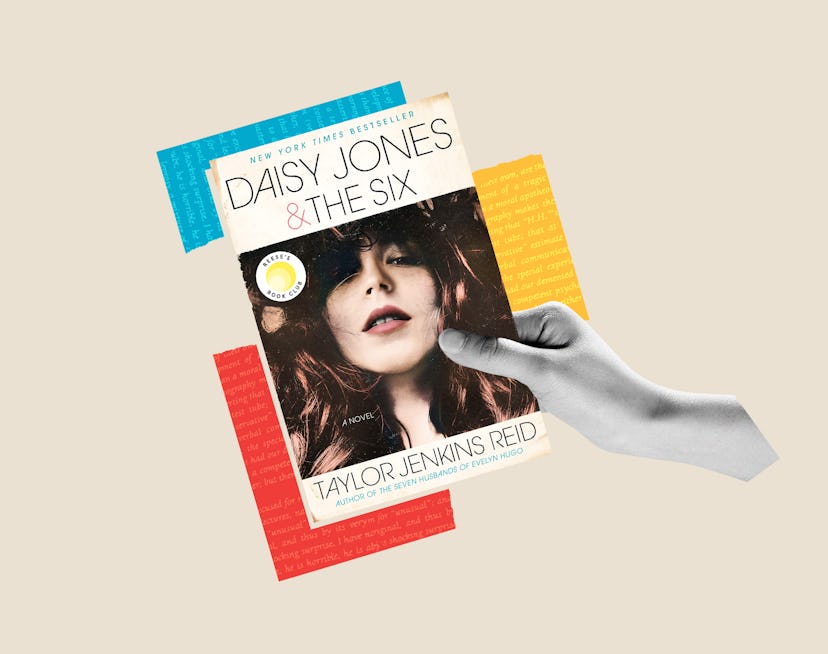Bustle Book Club
How Taylor Jenkins Reid Turns Celebrity Gossip Into Novels
The Daisy Jones & The Six author’s fascination with star image fueled a quartet of novels.

Taylor Jenkins Reid lives for gossip. Old Hollywood tell-alls like Starring Roles, celebrity deep dives by acclaimed journalists such as Anne Helen Petersen, tabloid blogs — she devours it all. “I can’t start writing until I’ve read everything that [Lainey Gossip has] put up for the day so far,” the Daisy Jones & The Six novelist tells Bustle. Her interest in gossip runs deeper than salacious information itself. “I’m interested in analyzing star image, in understanding the story we’re being told, and why we’re being told it,” she says.
Such is the basis for Reid’s most recent spate of bestselling novels, which she calls her “famous women quartet”: 2017’s The Seven Husbands of Evelyn Hugo looks at a Hollywood star of yore; 2019’s Daisy Jones, the story of a Stevie Nicks-esque figure and her erstwhile bandmates; 2021’s Malibu Rising follows a model and her family of surfers; and 2022’s Carrie Soto Is Back is about the world’s greatest tennis player. To write Daisy Jones — the television adaptation of which is now streaming on Amazon, and was produced by Reese Witherspoon’s Hello Sunshine — Reid had to pull from material more upmarket than Lainey, but when it comes to celebrity, the line between journalism and gossip is always hard to parse. “I did a lot of reading about the process of recording Rumours,” she says. “[I also read] Bruce Springsteen’s Born to Run and watched the Eagles documentary. I’d start to get really excited and be like, ‘Oh, I have to get to my computer.’”
As Daisy Jones acknowledges, no matter how expansive your research might be, you’ll likely never find the truth beneath the rumors. In the novel, though fans had spent decades trying to determine why the band had broken up — was there an affair? multiple? — it isn’t until Daisy and the gang speak up that the actual reason comes to light. But there’s nothing wrong with indulging in some harmless gossip, as Reid does when she needs a little break: “When I want to stop writing, I’m like, ‘Well, obviously I should go see if Lainey’s posted anything else today,” she says.
Below, Reid reflects on her search history, notebook collection, and Steve Miller Band phase.
On the icon she can’t stop reading about:
Elizabeth Taylor has a biography [Elizabeth Taylor: The Grit & Glamour of an Icon] that her estate just put out, which is incredible. I’m now, again, harping on Elizabeth Taylor, but there’s this really great book called Furious Love, which is specifically about Elizabeth and Richard Burton and the complexity of their relationship. That was very influential to me in the writing of the Seven Husbands of Evelyn Hugo.
On the strangest corners of her search history:
The things I have to Google worry me sometimes. Sometimes I’ll just Google “I’m a writer” so there’s evidence of my search history. One time I Googled, “When did people start saying stuff bites?” In the ’80s, were people saying like, “Oh, that sucks?” And at the same time, on Daisy Jones, I spent a lot of time Googling what drugs people used at what time, what for, and what they called them. I was like, “I really don’t want someone to see this search history.”
On the music that inspired the Dunne Brothers:
It’s only once I’m not writing that the music turns on, so that I feel inspired for next time. For Daisy Jones, it was a lot of Springsteen, Tom Petty, Crosby, Stills, Nash & Young, Linda Ronstadt, Carole King, Joni Mitchell, obviously Fleetwood Mac, solo Stevie Nicks, Dire Straits. I got very granular about it, where it was like, “Oh, I’m writing about a period of time [focused on] the Dunne Brothers [characters]. So what did they sound like [then], as opposed to what they would sound like later?” I got really into the Steve Miller Band for a minute. The Kinks, too. You end up going in these directions that you don’t foresee until you get there.
On the spiritual process of choosing a notebook:
Technically I have two [notebooks], which sit right on top of each other. One is my to-do list, my little doodles, my notes, and everything. Then with every single book [I write], I have a notebook that is filled with all of my research. I’m very particular about each notebook, and I have a spiritual moment in choosing the notebook. Does it feel like what I’m going for? Does it evoke the feelings I’m trying to convey? Then I just cram that thing full of information from books, TV shows, and Wikipedia pages that I’m reading.
This interview has been edited and condensed for clarity.
This article was originally published on